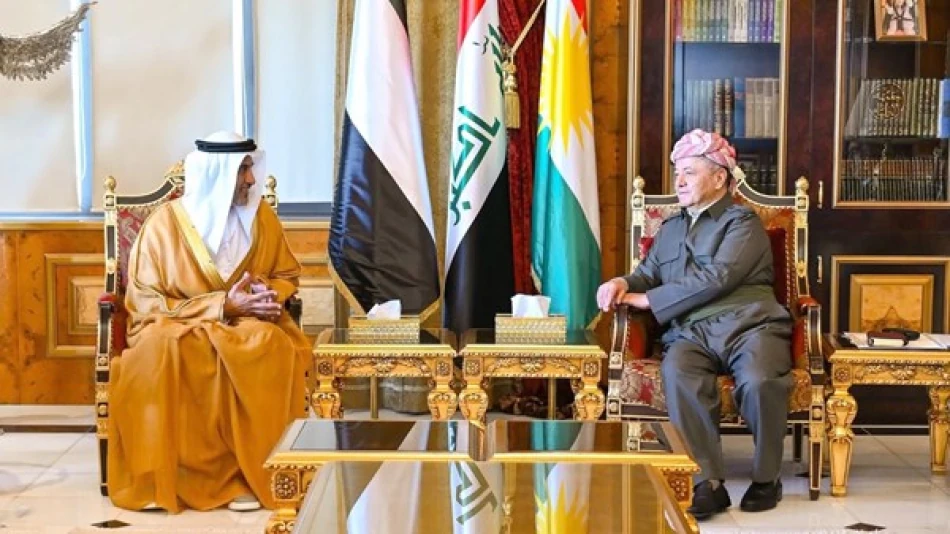
UAE Delegation Explores Opportunities for Cooperation in Iraqi Kurdistan
UAE Strengthens Economic Ties with Iraqi Kurdistan in Strategic Diplomatic Push
The United Arab Emirates has intensified its diplomatic outreach to Iraqi Kurdistan through a high-level delegation visit, signaling Dubai's broader strategy to expand economic influence across Iraq's autonomous regions. The September 10-11 meetings between UAE Minister of State Saeed Mubarak Al Hajri and Kurdistan's top leadership underscore the Gulf state's calculated approach to diversifying regional partnerships beyond traditional federal government channels.
High-Stakes Diplomatic Engagement
The UAE delegation, led by Al Hajri in his capacity as Foreign Minister's Envoy for Economic Affairs, conducted extensive meetings with Kurdistan's political hierarchy. The discussions included Democratic Party of Kurdistan leader Masoud Barzani, Kurdistan Regional Government President Nechirvan Barzani, Prime Minister Masrour Barzani, and Deputy Prime Minister Qubad Talabani.
Al Hajri conveyed personal greetings from UAE President Sheikh Mohammed bin Zayed Al Nahyan, Vice President and Prime Minister Sheikh Mohammed bin Rashid Al Maktoum, and Deputy President Sheikh Mansour bin Zayed Al Nahyan, elevating the diplomatic significance of the engagement.
Economic Diversification Strategy
Beyond Oil Partnerships
The talks centered on expanding cooperation across economic, investment, and cultural sectors, reflecting the UAE's systematic approach to building comprehensive partnerships. This mirrors Dubai's successful model in other emerging markets, where initial trade relationships evolve into broader economic ecosystems encompassing finance, tourism, and technology transfer.
The delegation included representatives from the UAE's Ministry of Foreign Affairs, Ministry of Foreign Trade, and the Alef Foundation, indicating serious institutional commitment beyond ceremonial diplomacy.
Infrastructure and Investment Focus
Kurdistan officials highlighted the region's urban development and sectoral progress, positioning it as an attractive investment destination. Al Hajri's praise for Kurdistan's infrastructure advancement suggests potential UAE involvement in ongoing reconstruction and modernization projects.
Regional Context and Strategic Implications
Gulf Competition for Iraqi Influence
This diplomatic push occurs as Gulf states increasingly compete for influence in post-conflict Iraq. While Saudi Arabia has focused on federal government relations and religious ties, the UAE appears to be pursuing a more targeted approach by engaging directly with autonomous regions like Kurdistan.
The strategy parallels UAE investments in other federal systems, such as its economic partnerships with individual Indian states or its targeted approach to specific sectors in African markets.
Kurdistan's Economic Positioning
For Kurdistan, UAE engagement offers crucial economic diversification beyond traditional oil revenues and Turkish-Iranian trade corridors. The region's relative stability and autonomous governance structure make it an attractive partner for Gulf investors seeking lower-risk entry points into the broader Iraqi market.
Cultural Diplomacy and Soft Power
The delegation's visit to UNESCO World Heritage sites in Kurdistan demonstrates the UAE's sophisticated approach to relationship-building, combining economic interests with cultural appreciation. This soft power element has proven effective in UAE diplomatic strategy across Asia and Africa.
The roundtable organized by Kurdistan's Council of Ministers and meetings with the Kurdistan Foundation suggest institutional frameworks are being established for sustained cooperation beyond individual political relationships.
Market Implications and Future Outlook
This engagement likely precedes concrete investment announcements in sectors where the UAE has demonstrated expertise: aviation, logistics, financial services, and urban development. Kurdistan's geographic position as a gateway between Turkey, Iran, and Arab Iraq makes it strategically valuable for UAE companies seeking regional expansion.
The timing also coincides with Iraq's broader economic stabilization efforts and Kurdistan's push to attract foreign investment to reduce dependence on federal budget transfers from Baghdad.
Most Viewed News

 Layla Al Mansoori
Layla Al Mansoori






